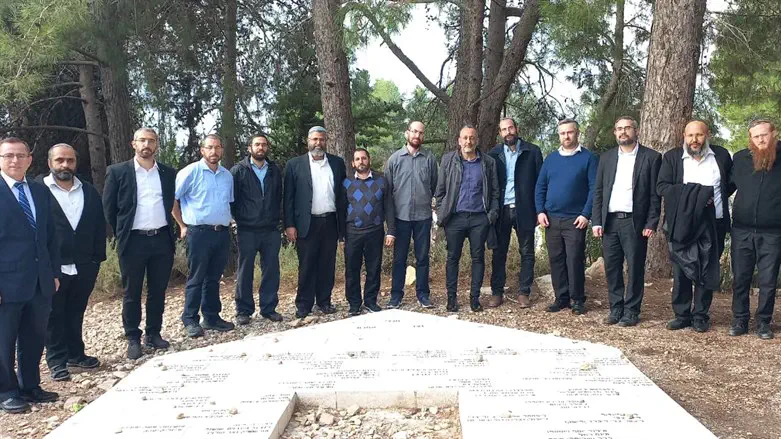
Not long ago, Yeshiva University celebrated its chag hasemikhah, in which they celebrated the rabbinic ordination of 135 new rabbis. This allowed me to reflect on the time I was honored to be part of such a celebration in 2016 and march with other newly ordained rabbis in this same institution that ordained my grandfather, Rabbi Baruch Poupko, in 1941 and realize how radically the Modern Orthodox rabbinic world has changed over the past few decades.
Thinking about the brilliant, motivated, and highly qualified rabbis who graduated Yeshiva University around the same time I did, I cannot help but feel a sense of loss. Why loss? Because just eight years later, too few of these rabbis have been able to share their talent with the Jewish community.
Reflecting now on the rabbis I studied with, befriended, heard of, and saw so many share high expectations for them, I would say that too few of them got the opportunity to share their talents with the Jewish people. Today, some of them work for various non-profits, fundraising, academia, law, accounting, and many other professions outside of the rabbinate. Some moved to Israel, where they do not practice their rabbinical skills; some live in large Jewish communities, where it is hard to feel their influence, and too few of them went into education, outreach, or rabbinic positions. This is a loss to them, their families, and the broader Jewish communities, which have made major contributions and sacrifices for this future generation of rabbis.
So why is it that too few of my fellow millennial rabbis have fulfilled their rabbinic potential and taken meaningful pulpit, educational, and outreach positions? The answer to this points to several important facts in American Jewish life.
The first and most important change in Modern Orthodox living is geographical. Jewish communities in North America have clustered up around very few very large population centers. Communities that are not in the New York, New Jersey, Florida, Los Angeles and one or two more places have been dwindling. Middle American medium-size communities are often struggling, so the need for rabbis to fill positions in those cities has become smaller. In cities with large concentrations of Modern Orthodox Jews, the classical role of a full-time pulpit rabbi is diminished, the infrastructure of Jewish life is vast and robust, and the role of the rabbi as a builder and sustainer of the community becomes much smaller.
There is also a demographic factor. The growing communities are the Hasidic and Yeshivish communities, which tend, Baruch Hashem, to have many more children. In cities outside the large clusters of Jewish communities, there are major rapidly developing communities. Those communities are not Modern Orthodox. From Houston to Boston, to Phoenix, Toronto, and Detroit, the American haredi communities are growing at a rapid rate. Those communities are not looking for modern Orthodox rabbis.
Then, there is also the Chabad factor. A historic number of Chabad rabbis have been opening synagogues and Chabad houses and filling ordinary pulpit positions, so the need for Modern Orthodox rabbis has significantly declined. Chabad rabbis, who are usually more entrepreneurial, outreach inclined, and often do their own fundraising, have been taking many traditionally Modern Orthodox pulpits–especially when those pulpits are far from the large Jewish population centers, which means a decline in Modern Orthodox rabbis taking those pulpits.
This is not to say there are no communities in Middle America hungry for a good Orthodox and modern rabbi. It does mean, though, that the size of the community, compensation, and work available to be done are much smaller than they have been in the past.
The declining demand for rabbis leaves many highly gifted and qualified Modern Orthodox would-be-pulpit-rabbis seeking employment options that are non-rabbinic, administrative, or moving to Israel. Needless to say that moving to Israel is a high ideal of our people, and those doing so should be commended.
At the same time, the Jewish Orthodox community, which has poured so many resources into training and raising this generation of rabbis, have a candid conversation about this and see if perhaps there is a better way to put to use the skills of so many rabbis. Yeshiva University and other non-Chabad rabbinic training institutions need to have a serious conversation among themselves and with their students about the future of the American Orthodox rabbinate. Ways should be found for gifted, trained, and ordained rabbis to utilize their skills despite not being in a geographical position to serve as traditional rabbis.
It is also a moral duty of those who have trained as rabbis and made that long journey, to seek ways to further the cause they had done so much to pursue, albeit in a different format than they way they had planned for it. It breaks my heart to see highly qualified rabbis quietly resign themselves to different professions, completely abdicating their training and many gifts - it hurts, because a pulpit is not the only way to give back to the community or to leave your mark.
As the challenges the Jewish people face continue to increase and change rapidly, our people need advocates, leadership, and inspiration. The Orthodox community must think of more ways to use the skills of its trained rabbis, and ordained rabbis who took the non-rabbinic path ought to think of more ways in which they can utilize their training and gifts to be there for the Jewish people in their time of need.